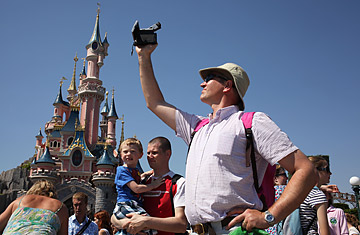
Castle in the sky Disney overestimated visitors and their spending
(3 of 3)
Playing It Cool
Surprisingly, French attitude is one thing that's playing in Euro Disney's favor. The controversial ban on alcohol was dropped after the park's financial troubles began in the 1990s; this year the restaurants are even selling special anniversary bottles of grenache, chardonnay and merlot. Euro Disney has ramped up advertising in France in recent months, and Gonzalez insists, "We're not trying to impose anything. We're just trying to share." That, plus special deals for residents of the Paris region, has helped boost the proportion of French visitors to half the park's total, up from 40% in 2000. Gonzalez says his market research shows an important shift in popular attitude, thanks to the company's softer, less aggressively American approach. The percentage of French people who react negatively to the Disney image has dropped sharply in the past five years.
Euro Disney has even made a stab at wooing the Parisian intellectual crowd. In 2009 it asked nine authors to write short stories loosely related to the park, and Flammarion, one of France's biggest publishers, issued the results as a paperback called, simply, Disneyland. Among the stories is one by David Abiker, who imagines a special part of the park dedicated exclusively to worn-out dads who can sit quietly in a café and read the sports pages. Another is by Simonetta Greggio, who imagines the filmmakers Federico Fellini and Roman Polanski visiting a Disney park together in 1964, where "they ogle the backsides of the pretty Snow Whites and other Minnies with amused indulgence."
But French philosophers are hardly Euro Disney's core audience. Teenagers, on the other hand, clearly are. On a Tuesday evening in July, a rare dry day in a rainy month, a crowd gathers along Main Street, USA, a good hour before the 10:15 parade, waiting for darkness to fall. They have come in their thousands, lining the sidewalk three and four deep, spilling out of the restaurants and stores as they wait for the nightly procession of Disney heroes, heroines and villains. At the sight of the first colorful floats, there are cheers and applause, and a 16-year-old girl named Laure Dupois, who is standing on a bench with a group of teenage friends, starts chanting in English, "Mickey, we love you! Mickey, we love you!"
Her friends start laughing and then join in. "Mickey, we love you! Mickey, we love you!" Jean-Paul Sartre is probably turning in his grave.
